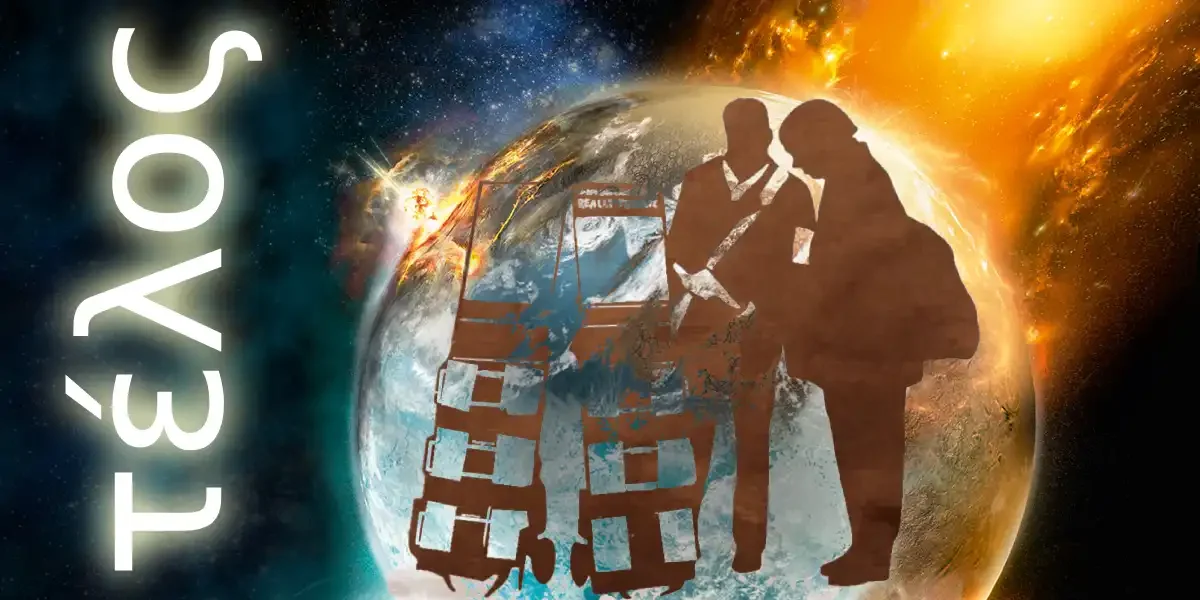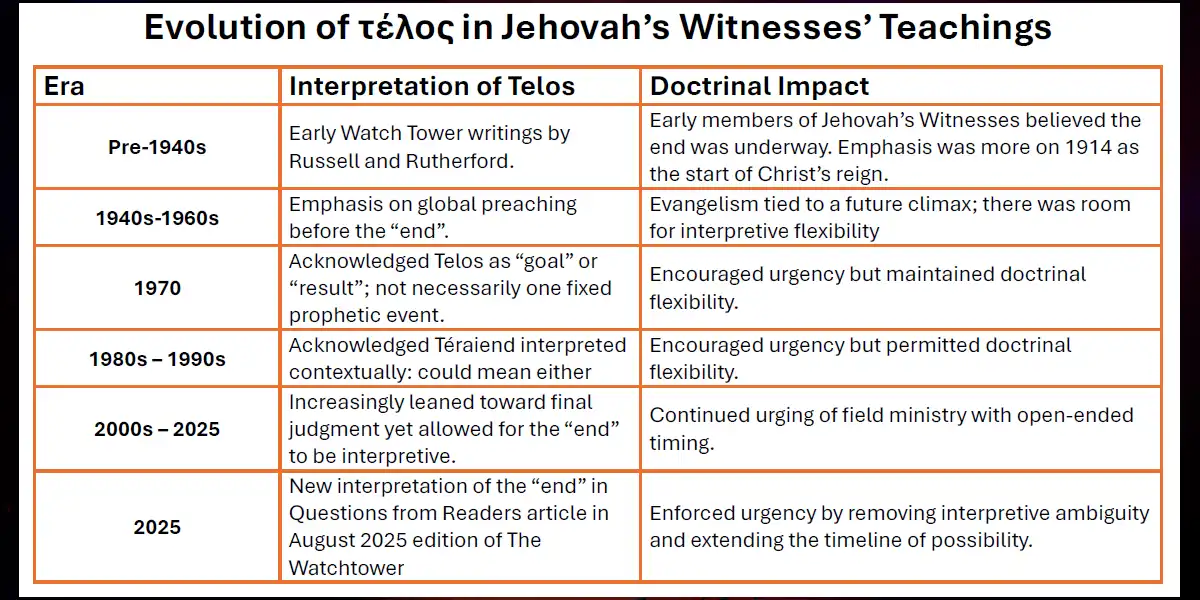More than 11 years revealing secrets because there is no excuse for secrecy in God’s true religion – The Watchtower, June 1st 1997; Dan 2:47; Matt 10:26; Mark 4:22; Luke 12:2; Acts 4:19, 20.

Telos, why is the “End” re-interpreted yet again?
Published By: Dr Cyberdyne, May 21st, 2025
When “The End” keeps changing, what does it say about the message?
If there’s one thing we as Jehovah’s Witnesses are known for, it’s our unflinching commitment to spreading the message that “the end is near.” For well over a century, our literature has hammered home the urgency of global evangelism, warning that the current system of things is teetering on the brink of destruction.
But what happens when “the end” itself — the very core of our message — gets redefined?
In a Questions from Readers section of a recent edition of The Watchtower (August 2025), anonymous writers for Jehovah’s Witnesses offer a notable reinterpretation of Jesus’ words in Matthew 24:14. This oft-cited verse states:
“This good news of the Kingdom will be preached in all the inhabited earth for a witness to all the nations, and then the end [Greek: telos] will come.”
Historically, our enlightened organization has taught that this “end” marked the conclusion of the preaching work — a final checkpoint that would trigger Armageddon. But now, the message has changed. τέλος (Telos), we now assert, refers not to the end of the preaching phase, but rather to Armageddon itself. In other words, the preaching continues until the world is destroyed — with no clear cutoff.
This isn’t just a theological footnote. It’s a major recalibration with practical consequences. And for those paying attention, it raises more questions than it answers.
As Jehovah’s Witnesses, we have made the Greek word telos a cornerstone of our eschatology. But how we interpret that word has shifted significantly over time, revealing not just evolving scholarship but evolving organizational goals.

The global preaching work will not end before Armageddon.
This question cuts to the core of the issue: Did the word telos suddenly change in meaning? Not at all.
Early Christian writers like John Chrysostom and Origen recognized telos as referring to the “end” in different ways — sometimes to the end of the Jewish system (70 CE), sometimes to the end of the world, and occasionally to spiritual fulfillment. Their interpretations were diverse but anchored in context rather than dogmatic finality.
So why now the rigid reinterpretation?
It seems that the word’s Greek flexibility is being subordinated to organizational necessity. Rather than treat telos as a term with multiple applications, the current interpretation narrows it for institutional clarity, giving the appearance of linguistic authority while advancing a doctrinal goal.

The redefinition … essentially extends the obligation to preach.

It’s the perfect insurance policy:
the end is always near, and your duty is always ongoing.
This is where the real issue lies: trust.
When our religious organization revises its prophetic benchmarks without acknowledging past mistakes or motivations, it risks sounding less like a faithful steward of truth and more like a self-perpetuating system. The redefinition of telos isn’t merely academic — it changes the nature of the commitment being asked of members.
And the timing of this change? Not insignificant. After decades of expectations — including failed predictions about the generation that saw 1914 — the organization now offers a version of prophecy that can never be wrong, because it has no measurable endpoint until destruction arrives.
In practical terms, it’s the perfect insurance policy: the end is always near, and your duty is always ongoing.
![If truth really is the hallmark of divine guidance, then transparency ... [is] essential.](https://avoidjw.org/wp-content/uploads/2025/05/497.jpg)
If truth really is the hallmark of divine guidance, then transparency … [is] essential.
This shift in the interpretation of telos may be presented as “new light,” but it casts a long shadow. For some of us, it will feel like renewed clarity. For others, it will feel like a theological sleight of hand.
At the very least, it calls for critical reflection on the part of every single member. Unfortunately, most of us will mindlessly trust our leaders and swallow it whole without a second thought.
Not on whether the end will come — that’s a question of faith — but on how often the goalposts can move before one starts asking who’s holding the map.
If truth really is the hallmark of divine guidance, then transparency — even about past missteps and doctrinal motives — is not just admirable. It’s essential.
Because if “the end” keeps changing, maybe it’s not the world that’s on the verge of collapse — but the credibility of those who claim to know when it will.

References and documents that support this article.
What is the End of the World?
Questions from Readers
Organized to do Jehovah’s Will
Reasoning from the Scriptures
Insight on the Scriptures, Vol. 2
Strong’s Concordance
Entry G5056: Definition of Telos
Thayer’s Greek-English Lexicon of the New Testament
Definition & Usage of Telos
Liddell-Scott-Jones (LSJ) Greek Lexicon
Classical & Koine Greek usage of Telos
The Bible
Various uses of the word Telos:
Matthew 24:14
2 Timothy 4:7
1 Peter 1:9
1 Corinthians 15:24
Ancient Interpretations of Telos in Matthew 24:14
Origen of Alexandria
Interpreted “end” in the context of spiritual culmination and the fall or Jerusalem.
John Chrysostom
Describes the “end” as both judgment and historical event.
Eusebius of Caesarea
Offers insights on early Christian preaching and views about the fulfillment of Matthew 24:14.
Modern Interpretation of Telos in Matthew 24:14
N.T. Wright
Discusses telos in relation to prophetic fulfillment and Jewish apocalyptic thought.
Craig S. Keener
Analysis of Matthew 24 and the use of prophetic language.
Raymond E. Brown
Discusses early Christian eschatology and the flexibility of end-time terminology.